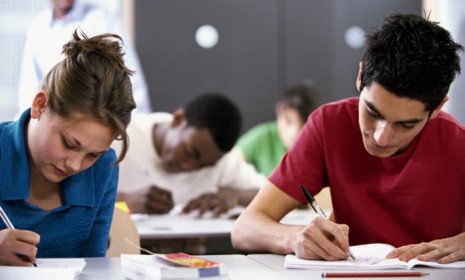America's 'huge' college readiness problem
A testing-service report says most high school grads head off to college without basic skills and knowledge they'll need

A free daily email with the biggest news stories of the day – and the best features from TheWeek.com
You are now subscribed
Your newsletter sign-up was successful
It's nearly time to head back to school, but according to an annual report from ACT, an organization that administers college-entrance exams similar to the SAT, most recent high school graduates aren't prepared for the academic challenges ahead. Here, a brief guide to the country's "huge college readiness issues":
How far behind are these students?
Only one out of four students who took the ACT exam was adequately prepared in all four areas it covers: English, reading, math, and science, according to the testing service. Out of the 1.6 million students tested (49 percent of the class of 2011), 28 percent weren't ready for college-level classes in any of the subject areas.
The Week
Escape your echo chamber. Get the facts behind the news, plus analysis from multiple perspectives.

Sign up for The Week's Free Newsletters
From our morning news briefing to a weekly Good News Newsletter, get the best of The Week delivered directly to your inbox.
From our morning news briefing to a weekly Good News Newsletter, get the best of The Week delivered directly to your inbox.
How is readiness defined here?
The ACT has benchmarks to estimate whether a student has a 50 percent chance of getting a B and a 75 percent chance of getting a C in entry level college course like Biology, College Algebra, or English Composition. Critics say standardized tests can't accurately forecast college grades. Both the ACT and the College Board, which administers the SAT, admit that high school grades offer better insight into how a student will fare in college.
Where is the problem the most intense?
Science gave students the most trouble — only 30 percent met the standard in that. Forty-five percent meet the cut-off in math, compared to 52 percent in reading and 66 percent in English. Scores varied by state and ethnicity, too. Students from Massachusetts and Connecticut scored the highest; those from Mississippi and Tennessee scored lowest. Also, 41 percent of Asian-Americans and 31 percent of whites met the benchmarks in all four subjects, compared to 11 percent of Latinos and 4 percent of African-Americans.
A free daily email with the biggest news stories of the day – and the best features from TheWeek.com
Is this something new?
Actually, the numbers improved slightly this year, rising by 2 and 1 percentage points in math and science, respectively, from 2010 to 2011. Reading and English were unchanged. Still, the results are alarming. Supporters of "No Child Left Behind" promised we would see a decrease in disparities among ethnic groups, says Bob Schaeffer with Fair Test, a standardized testing watchdog. "But, academic gains, as measured by ACT, are stagnant, and racial gaps are increasing." Education Secretary Arne Duncan says the report confirms that "states need to raise their academic standards and commit to education reforms that accelerate student achievement."
Sources: ABC News, ACT, LA Times, Wash. Post
-
 How the FCC’s ‘equal time’ rule works
How the FCC’s ‘equal time’ rule worksIn the Spotlight The law is at the heart of the Colbert-CBS conflict
-
 What is the endgame in the DHS shutdown?
What is the endgame in the DHS shutdown?Today’s Big Question Democrats want to rein in ICE’s immigration crackdown
-
 ‘Poor time management isn’t just an inconvenience’
‘Poor time management isn’t just an inconvenience’Instant Opinion Opinion, comment and editorials of the day